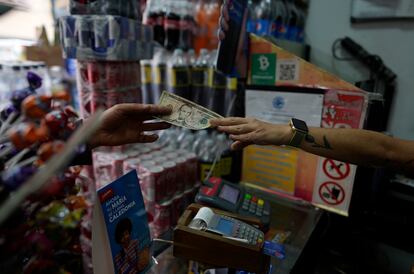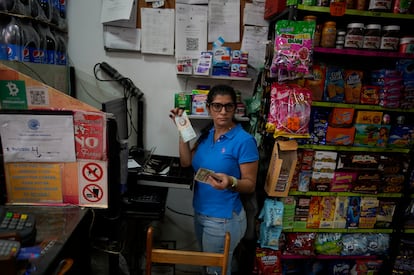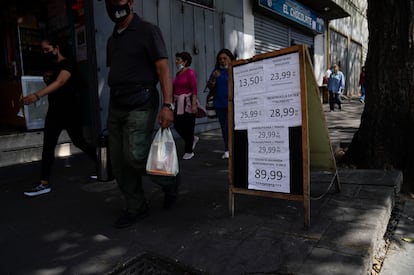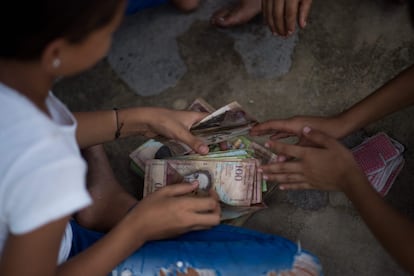Why rampant capitalism is taking hold in Venezuela
A new neoliberal reality has emerged in the Chavist nation through the use of the US dollar, state controls being lifted and a new relationship with Washington

Adriana drives through the streets of downtown Caracas while the city sleeps. She picks up customers through the Yummy app, the Venezuelan Uber. For a few months, this was the best-kept secret among the local micro-economy: demand was through the roof and a good night an alert worker could make around $60. But soon word spread and many people put their cars to work. Adriana’s customer pulls out a $20 bill to pay for the trip, which costs $17. She pretends to search the glove compartment for change, but they both know how this ends. “Sorry, I don’t seem to have any change. Thanks, see you!” And she drives off $3 better off. Low denomination bills are scarce in the headlong capitalism that is gripping Venezuela. Everybody is thinking about money. Daily life is governed by greenbacks. The country, through Chavism, has moved on from the unsuccessful application of the Socialist Bolivarian revolution to a process of opening up branded in the forges of liberalism. The phenomenon has caused a mirage of economic recovery to appear.
Gone are the days of rigid controls. Up until very recently, Venezuelans hid their dollars because it was a crime to possess them beyond the watchful eye of the state. People had to queue for hours to buy rationed food at regulated prices and bolívars, the local currency, were few and far between. The panorama now is completely different. The use of the dollar as everyday currency, the lifting of price controls and tariff-free imports have changed the reality under which Venezuelans previously attempted to subsist.
The economy, says Luis Vicente León, an economist and president of the polling company Datanálisis, rebels against the established order faster than societies themselves. “What is happening in Venezuela, as it did before in China or Russia, is that people are looking for imaginative solutions to the control and interventionism of the state. When the government experienced problems due to sanctions and international isolation, they started to realize that riding this surfboard that society had created was more of a solution than a problem. And the government jumped on.” And exactly the same thing happened with the dollar, which went almost overnight from being demonized to providing some guarantee of a certain stability.
The dollar is now used in almost 70% of commercial transactions, according to some economic observers, and in a distorted economy it has also been infected by inflation: more and more dollars are required to buy the same thing. Ecoanalítica noted that the dollar lost 50% of its purchasing power in Venezuela in 2021 and it forecasts another chunk being taken out of it this year. Life in dollars, in which those who can afford to seek refuge, is also becoming more expensive and retailers have taken to camouflaging prices in non-denominated amounts with the abbreviation Ref, for reference. The price of a pair of imitation shoes brought in via containers on which tax has not been paid in a shop in a commercial center is marked as Ref 30, which is to say, $30.

Nobody knows how many hours Venezuelans waste every time they open their wallet. Even the smallest transactions require a mental calculation of a few minutes to work out if the exchange rate applied by the shop is beneficial, which varies depending on the currency being used and convenience: if the extra tax has to be paid because a buyer only has dollars and their use has spiraled in recent months; if the price has to be rounded up because there are not enough low domination bills or coins for change; or if there is no other choice but to pay more for a product because they are only carrying devalued bolívars. In Venezuela’s convoluted economy, everything ends up being more expensive.
Paying for anything in Caracas creates scenes worthy of a Marx Brothers movie. One morning, for example, a woman turns to a stranger in the queue to pay for a parking lot with a dollar in her hand: the parking place costs five bolívars, a few cents more than the dollar at the official exchange rate. The stranger with bolívars on his card pays for her and keeps the dollar, which means she avoids paying 3% more because of the Large Transaction Tax (the difference between large and minimal is obviously irrelevant). Just paying for parking can be an odyssey.
The sui generis capitalism being practiced in Venezuela has created a bubble of expenditure and redistribution in which four million people are living, particularly in Caracas. It is an island of consumerism in the middle of a precarious economy. Traffic in the capital has been restored to the diabolical levels of any major Latin American city whereas previously, due to a lack of gas, the roads were practically empty. Entrepreneurs are opening nightclubs, restaurants, supermarkets, stores and pharmacies. Internationally famous singers are returning to perform. One of the trendiest spots, Bar Caracas, has a price list identical to clubs in New York. That doesn’t stop it from being jam-packed from Wednesday to Sunday. Bar Caracas is a terrace in a five-star hotel, the Tamanaco, where businesspeople from around the world stay, with local news on Google alert to try and understand what is happening in Venezuela. They have the feeling that if they get in quickly, before house and business prices start to recover, there is money to be made.

A large part of the population, however, has been excluded from this parallel economy. A recent study by consultant Think Anova has looked at the distribution of income in this new Venezuela bubble. “The income of 30% of the poorest section of the population fell or stagnated between 2020 and 2021, despite the fact that average income increased by 65% over the same period. In relative terms, only the richest 10% of the population improved their position in distribution. This ratifies that the results obtained unequivocally worsen income distribution in Venezuela.”
In between the two extremes, the middle class has tightened its belt, sometimes to the point of disappearing or being reduced to poverty. Ida Febres is a 31-year-old social communicator who says she is better off today than she was a few years ago because she no longer wonders where the next meal is coming from, but what she earns leaves noting for savings. “I earn more now because I work too much,” she says. She works in audiovisuals for an international company and is recording everything she can in Caracas to earn a contract: events, podcasts, plays. She works 16-hour days. She recently started taking a neighbor’s daughter to school. The dark rings under her eyes are evidence of how early she gets up to earn a little extra.
For Febres, peace of mind consists of securing private medical insurance for herself and her parents: the crisis in the public health system is something that hasn’t changed in Venezuela and it shows no sign of improving. That is why she works so hard, takes on debt and cuts back on her food expenditure and puts subsidized gas in her car even though that means long waits in line or getting up at dawn to fill the tank. “When my parents were young, they worked for goals, like buying a house, a car, and having a family. I can’t have those goals today, mine are smaller,” she says.
Sustainable growth
The industrial sector is working at 28% of its capacity after the economic mini-rebound and in the first quarter of the year is has registered growth in production and sales, according to the Conindustria union, which two decades ago brought 12,700 businesses together but now has only 2,200 members. “We want growth to be sustainable and to do that we have to restore the purchasing power of Venezuelans, and employment. That is synonymous with recovery,” says Luigi Pisella, president of Conindustria and a shoemaker, one of the most-affected sectors by an influx of low-quality, imitation footwear that has poured into the country after the government granted tariff benefits to imports. “To put that 28% into context, we can compare ourselves to Colombia, which is at 80%, Brazil, which is at 82%, or Argentina, which even with huge inflation and a financial crisis, is operating at 75% of its capacity,” adds Pisella. Also putting it into context are the factories that are only operational for a few months a year, then close and lay off all their staff. Only 53.8% of working-age people in Venezuela are employed, the lowest activity rate in the entire region.
Even with this production capacity, the industrial sector can supply half of the market due the drastic contraction of the economy. And it manages to do so with self-supply of energy in over half of the operating industries, given that public utility failures are also a hindrance to production. “It will be necessary to achieve an economic miracle of 10% annual growth over the course of 20 years for the economy to get back to the same size it was in 2012,” says Pisella. The shoemaker highlights a recent change in economic policy that “is a step in the right direction.” A total of 1,260 products from an initial list of 4,465 were finally removed from tariff exemptions that make it more expensive to buy Venezuela-made products, something that has been repeatedly requested by the country’s diminished business community. This subsidy has flooded the market with imported goods of every kind, making it impossible for Venezuelan industry, which is subject to various taxes, to be competitive. Working against Venezuelan producers is the voracity of the taxman and a lack of access to bank loans, which the government has almost completely cut off to artificially contain inflation and anchor the price of the dollar.
Economic opening up, political closure
This economic transformation toward greater openness has happened, paradoxically, at the same time as Nicolás Maduro has been encircled by sanctions of varying degrees applied by the US, the EU, Panama, Switzerland and Canada, in response to the authoritarian drift of the country, which has also resulted in economic ruin with Venezuela shedding 80% of its GDP in eight years, resulting in 6.1 million people seeking their fortunes overseas.

As has been the case in other sanctioned countries, Chavism has adapted. Ties with the United States, the country’s main oil buyer and previously a natural ally in the region, were severed. Venezuela made new friends: Iran, Turkey, Russia and China. With them, an attempt was made to circumvent the most well-aimed blow Washington had struck in 2019: the impossibility of selling oil freely on the global market, which forced geopolitical triangulations and huge discounts on crude. US President Joe Biden, to counter the energy crisis brought about by Russia’s invasion of Ukraine, has once again opened dialog with Caracas and made various concessions that have helped to ease tensions between the two countries. There is a strong possibility that all sanctions may be lifted, although US diplomacy is hamstrung by its support for the government of interim President Juan Guaidó. If sanctions were lifted, the Venezuelan administration would have more income, which would allow it to raise salaries, in turn sparking a rise in consumption that would set in motion the chain of economic growth, which is forecast at 5% to 10%, not inconsiderable numbers in any economy but insufficient in Venezuela. At that rate, the country would need decades to reach pre-Chavist economic levels.
Maduro has opened up his economy as best he can. He has net with business representatives, announced the sale of shares in bankrupt, state-owned companies for investment, but he has also tailored an opposition to his own requirements and maintains control over civic life. In Caracas, one can do business, become a millionaire, but politics remains off-limits. Persecution of dissidence continues and a law to limit international cooperation with NGOs protecting the victims of human rights violations is being discussed in the Chavist-controlled National Assembly.
After years of political friction, the opposition has ended up cornered by its own errors and the repressive machinery of Chavism. But there is still pressure, being applied at the negotiating table with Mexico and through sanctions, which have led to a leap in expectation in recent days. Febres, who is out all day trying to make ends meet, says the government has won just by surviving these years of turmoil. “Nobody is bothered about politics, all those that did are dead. People have got used to the fact we will always have the same government, and some people will call it a dictatorship. But we can’t waste our lives on that, we all have a lot of things we want to do.”
Tu suscripción se está usando en otro dispositivo
¿Quieres añadir otro usuario a tu suscripción?
Si continúas leyendo en este dispositivo, no se podrá leer en el otro.
FlechaTu suscripción se está usando en otro dispositivo y solo puedes acceder a EL PAÍS desde un dispositivo a la vez.
Si quieres compartir tu cuenta, cambia tu suscripción a la modalidad Premium, así podrás añadir otro usuario. Cada uno accederá con su propia cuenta de email, lo que os permitirá personalizar vuestra experiencia en EL PAÍS.
¿Tienes una suscripción de empresa? Accede aquí para contratar más cuentas.
En el caso de no saber quién está usando tu cuenta, te recomendamos cambiar tu contraseña aquí.
Si decides continuar compartiendo tu cuenta, este mensaje se mostrará en tu dispositivo y en el de la otra persona que está usando tu cuenta de forma indefinida, afectando a tu experiencia de lectura. Puedes consultar aquí los términos y condiciones de la suscripción digital.








































